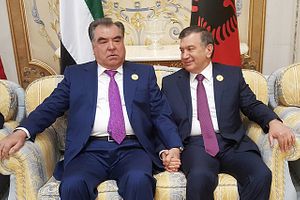There are high hopes for Uzbek President Shavkat Mirziyoyev’s upcoming state visit to Tajikistan, set for March 9-10.
In a little more than a year in office, Mirziyoyev has made strides to repair the country’s relations with its neighbors, making three visits to Turkmenistan, four to Kazakhstan and one to Kyrgyzstan. The Uzbekistan-Tajikistan relationship was in particularly poor condition by the time Mirziyoyev took over in Tashkent, having deteriorated steadily throughout Islam Karimov’s 25-year tenure as leader.
While Karimov traveled to Dushanbe in 2008 and 2014 — both times for Shanghai Cooperation Organization summits — the last state visit by an Uzbek president to Tajikistan was in 2000 (though Bruce Pannier astutely pointed out last month that Karimov’s June 2000 official visit “was an extension of Karimov’s trip to Dushanbe for a summit of the now-defunct Central Asian Economic Union”). Like Mirziyoyev’s visit to Kyrgyzstan last September, the upcoming trip to Tajikistan holds historic significance.
Previously, I’ve written about the state of the Tajikistan-Uzbekistan relationship and the diplomatic efforts under Mirziyoyev to nudge it back to normalcy. In January, at the upcoming trip was being planned, I wrote:
One early accomplishment underscored the absurd depths into which Uzbek-Tajik relations had fallen. In April 2017, direct flights resumed between Tashkent and Dushanbe for the first time in 25 years.
Reviving air, road and rail connectivity between the two countries — which share a long and convoluted border — is critical to Mirxiyoyev’s grander visions of regional cooperation.
This week, the Tashkent Times reported that the “most anticipated outcome from the Shavkat Mirziyoyev visit is the abolition of [the] visa regime between Uzbekistan and Tajikistan.”
The Tashkent Times also noted that since 2010 only two of 16 checkpoints between the two countries were in operation and that the Uzbek government had recently approved a decision to resume operations at nine border checkpoints — eight on highways and one via rail.
Tajik excitement seems focused on the reopening of the border, particularly a critical rail line between the two countries. Asia Plus, a Tajik news site, quoted a Tajik government source on February 28 saying that Uzbekistan had completed repair work on the Galaba-Amuzang railway. Eurasianet, citing TajikTA news agency, said the first cargo train would leave Termex, in southern Uzbekistan near the Afghan border, for Khurshedi in Tajikistan Khatlon region on March 1. Eurasianet noted that the particular stretch of railroad — which has been out of operation since late 2011 following a mysterious explosion, ostensibly the work of terrorists — also links into the Uzbekistan-Afghanistan railway which Tashkent and Kabul are intent on extending.
Asia Plus also reported that, according to a Tajik government source, Uzbekistan is considering abolishing entry fees for road traffic — freight and buses — transiting Uzbek territory. Uzbekistan has already reduced fees for rail freight.
Over the course of 2017, according to Trend, Tajikistan’s trade turnover with Uzbekistan increased by 85 percent — building upon a sixfold increase in 2016. This perhaps says more about the low starting point than it does about improving trade, but future gains will invariably be linked to a freer flow of people and goods across the Uzbekistan-Tajikistan border.
It’s all part and parcel of Mirizyoyev’s larger regional vision. Mirziyoyev saved Tajikistan for last. The hurdles to reach Dushanbe and, importantly, be able to come away with the kinds of agreements the region is yearning for were higher than for any of the country’s other neighbors. Optimism should be tempered by the realization that we are likely to be celebrating (if everything goes according to plan) the simple opening of several (though not all) the official checkpoints between two neighboring countries.

































